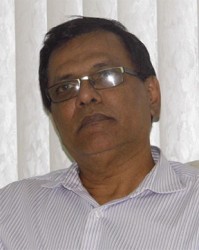Although there have been no reported cases of Ebola here, the Ministry of Health (MoH) is preparing for such an eventuality and the Berbice Regional Health Authority (BRHA) has heightened its surveillance of ports of entry in Berbice.
CEO of the BRHA, Dr. Vishwa Mahadeo during a press conference held recently told journalists that the health authority is cognizant of the vital role it plays in monitoring the ports of entry in Berbice for Ebola-infected persons, and has not taken this responsibility lightly. He explained that presently, trained Port Health Officers are working at backtrack routes and the Moleson Creek Ferry Terminal on the Corentyne, which serve as links on the Guyana side to Suriname, and assured that all the Environmental Health Officers have received special training in the detection, quarantining and handling of suspected Ebola-infected persons. “They have been trained in what to look out for and if the need arises what to do” stated Mahadeo, who further added that all the health officers have “attended more than one training sessions”.
Ebola is a virus that can lead to an often fatal viral haemorrhagic fever.
The World Health Organization (WHO) has reported that over 5000 people have been killed by the Ebola outbreak currently ravaging West Africa. The epidemic which has also sickened 14000 people, mostly from the West African countries of Liberia, Guinea and Sierra Leone is the largest Ebola outbreak ever recorded. Though signs indicate that the rate of new infections may be slowing there are still areas where transmission remains high, and the virus seems to be continuously emerging in new places both within the most affected countries and outside their borders.

For this reason Mahadeo said “the government is taking a stand like other Caricom countries to be very careful and not be just relaxing and allowing persons from Ebola prone areas to enter the country”. He added that since the ‘Ebola watch’ is a joint Caricom initiative, there would be several check points for travellers before they even reach Guyana. “They will first be checked either in Suriname or French Guiana before they come to our borders to come into Guyana. So they would have been checked somewhere else then come here”.
Moreover, he said the health authority is guided by whether or not a neighbouring country has any such cases. “When we heard that Brazil had yellow fever for example, there was heightened monitoring, heightened surveillance and other activities that were carried out in Guyana because there was the possibility that we may have some persons coming here with the fever”.
The onset of the Ebola disease is sudden and harsh. Infected persons develop fever, severe headache and muscle aches, and loss of appetite. Then, within a few days the virus causes a condition known as disseminated intravascular coagulation which is marked by both blood clots and haemorrhaging, and in the case of Ebola fever, clots are concentrated in the liver, spleen, brain and other internal organs, forcing capillaries to bleed into surrounding tissues.
It is important to note however, the Ebola virus has an incubation period of 4 to 10 days. And as such, according to Mahadeo, regardless of the screening done, it would be difficult for the health officers to identify suspected Ebola infected persons if the virus was now in the incubation stage “because during this window period, the person exhibits no signs. But once they start exhibiting signs and symptoms they could be identified”.
A weakness in the system is the fact that the health authority does not have a round-the-clock monitoring system for the Guyana-Suriname backtrack routes. “To say that we have a 24 hrs presence at the back track would not be correct”, Mahadeo admitted. “But with the Canawaima (ferry to Suriname) we have a port health officer every time it comes in and they are trained to look for certain signs and symptoms”.
The Ministry of Health, with the aid of its partners including WHO and PAHO, has been working with the BRHA. So much so, that “a lot of intensive training is happening and that will continue”. Mahadeo further revealed that all the doctors attached to the BRHA have been trained and plans are underway to train all primary health care workers.
“The first sets of people that are usually struck down are health workers,” remarked Mahadeo. Consequently, “if your health workers get hit down, your population is at the mercy of the disease and that is one of the problems I think some countries in West Africa are facing,” he posited. “If you look at the history of medicine you would find that when they had the most serious cases of influenza that caused a lot of deaths, it was because the health workers were struck down and the health workers could not have even given first aid to assist patients, because they [themselves] were sick”.
This is why the BRHA has and will continue to focus its attention primarily on training its health workers. Additionally, the BRHA plans to initiate a few programmes geared at sensitizing and educating the public on Ebola.
Government, in early September, issued travel restrictions as part of its efforts to prevent the entry of Ebola into Guyana.





